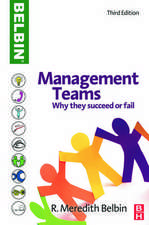Nepotism in Organizations: SIOP Organizational Frontiers Series
Editat de Robert G. Jonesen Limba Engleză Paperback – 21 dec 2017
| Toate formatele și edițiile | Preț | Express |
|---|---|---|
| Paperback (1) | 469.34 lei 6-8 săpt. | |
| Taylor & Francis – 21 dec 2017 | 469.34 lei 6-8 săpt. | |
| Hardback (1) | 949.78 lei 6-8 săpt. | |
| Taylor & Francis – 6 sep 2011 | 949.78 lei 6-8 săpt. |
Din seria SIOP Organizational Frontiers Series
-
 Preț: 356.63 lei
Preț: 356.63 lei -
 Preț: 364.47 lei
Preț: 364.47 lei -
 Preț: 356.78 lei
Preț: 356.78 lei -
 Preț: 371.71 lei
Preț: 371.71 lei - 8%
 Preț: 407.72 lei
Preț: 407.72 lei -
 Preț: 359.35 lei
Preț: 359.35 lei -
 Preț: 454.38 lei
Preț: 454.38 lei -
 Preț: 505.86 lei
Preț: 505.86 lei -
 Preț: 438.09 lei
Preț: 438.09 lei -
 Preț: 498.52 lei
Preț: 498.52 lei -
 Preț: 455.01 lei
Preț: 455.01 lei - 12%
 Preț: 327.73 lei
Preț: 327.73 lei -
 Preț: 498.91 lei
Preț: 498.91 lei -
 Preț: 357.92 lei
Preț: 357.92 lei -
 Preț: 498.34 lei
Preț: 498.34 lei -
 Preț: 460.99 lei
Preț: 460.99 lei -
 Preț: 494.11 lei
Preț: 494.11 lei - 15%
 Preț: 483.65 lei
Preț: 483.65 lei - 15%
 Preț: 490.89 lei
Preț: 490.89 lei -
 Preț: 489.26 lei
Preț: 489.26 lei -
 Preț: 494.11 lei
Preț: 494.11 lei - 18%
 Preț: 1103.51 lei
Preț: 1103.51 lei - 15%
 Preț: 443.54 lei
Preț: 443.54 lei -
 Preț: 449.38 lei
Preț: 449.38 lei -
 Preț: 503.70 lei
Preț: 503.70 lei - 18%
 Preț: 900.65 lei
Preț: 900.65 lei -
 Preț: 482.56 lei
Preț: 482.56 lei - 15%
 Preț: 457.33 lei
Preț: 457.33 lei - 18%
 Preț: 1007.36 lei
Preț: 1007.36 lei -
 Preț: 413.76 lei
Preț: 413.76 lei - 25%
 Preț: 768.30 lei
Preț: 768.30 lei
Preț: 469.34 lei
Nou
Puncte Express: 704
Preț estimativ în valută:
89.81€ • 94.02$ • 74.31£
89.81€ • 94.02$ • 74.31£
Carte tipărită la comandă
Livrare economică 05-19 aprilie
Preluare comenzi: 021 569.72.76
Specificații
ISBN-13: 9780815390831
ISBN-10: 0815390831
Pagini: 318
Dimensiuni: 152 x 229 x 20 mm
Greutate: 0.45 kg
Ediția:1
Editura: Taylor & Francis
Colecția Routledge
Seria SIOP Organizational Frontiers Series
Locul publicării:Oxford, United Kingdom
ISBN-10: 0815390831
Pagini: 318
Dimensiuni: 152 x 229 x 20 mm
Greutate: 0.45 kg
Ediția:1
Editura: Taylor & Francis
Colecția Routledge
Seria SIOP Organizational Frontiers Series
Locul publicării:Oxford, United Kingdom
Cuprins
E. Salas, Series Foreword. Preface. R.G. Jones, Defining a Psychology of Nepotism. A. Gutman, Nepotism and Employment Law. P. W. Muchinsky, The Nepotistic Organization: What is This Place and How Do the People Make It? E. Van Hooft, T. Stout, Nepotism and Career Choice, Job Search, and Job Choice. M.W. Dickson, L.R.G. Nieminen, B.J. Biermeier-Hanson, Nepotism and Organizational Homogeneity: How the ASA Process is Accelerated by Non-merit-based Decision-making. T.E. Becker, Nepotism and the Commitment of Relevant Parties. A. Masuda, M. Visio, Nepotism Practices and the Work-Family Interface. K.H. Mhatre, R.E. Riggio, H.R. Riggio, Nepotism and Leadership. G. Wated, J.I. Sanchez, The Cultural Boundary of Managing Nepotism. B.H. Mulder, A Model of Organizational Nepotism. R.G. Jones, Toward a New Understanding of Nepotistic Organizational Behavior.
Notă biografică
Robert G. Jones is professor of psychology and department head at Missouri State University. After a first career in music and banking, Bob returned to school to get his PhD in industrial/organizational psychology from The Ohio State University in 1992. In this second career, Bob and his students, colleagues, and clients have dealt with a broad range of issues in selection and assessment. Most of this work has focused on understanding and managing the basis for applied, person-perception-based assessments, including emotive perception and prejudices. He has addressed these issues in various publications, numerous applied settings, and classrooms in the U.S., Australia, and the Netherlands. As Book Review Editor of Personnel Psychology (1994-2004), Bob had the pleasant task of reading lots of books, including the ones that inspired this one.
Recenzii
"Nepotism in Organizations is a first in I/O psychology. Jones and his chapter contributors have covered a wide range of topics related to nepotism, clarified definitions and issues related to nepotism in organizations, and made a number of suggestions for research. ... [This book] should be on every I/O psychologist's bookshelf. For the practioner, the book gives insights for interventions to minimize its positives. For the academic and graduate student, the book provides a wealth of interesting ideas to think about and possible research topics." - Stephen M. Colarelli, Central Michigan University, USA, in Personnel Psychology
"Nepotism has probably been a common approach to employing people since the inclination to use organized labor in order to get work done. But as made clear by this book edited by Bob Jones, it is also the modus operandi of many businesses today, whether it’s an entrepreneur starting a business, a patriarch running a family firm or even, in several parts of the world, a large multi-divisional enterprise. When it comes to having people work for us, we often favor clansmen over strangers. The lesson is clear: anyone who wants to gain a more complete understanding of the real "world" of work must definitely read this book." - Richard Klimoski, Dean of the School of Management, George Mason University, USA
"In many organizations, the elephant in the room issue has been the brother-in-law in the room. With this volume, we have the cogent and instructive treatment of organizational nepotism we’ve needed for so long." - Robert B. Cialdini, Author, Influence: Science and Practice
"Most companies in the world are nepotistic and quite effective. Further, the longest-lived companies are nepotistic, and they need to take survival into account when considering what performance really is all about, as contrasted with milking the cow to death, which public companies are very good at. This subject has not been covered well elsewhere and is a pervasive phenomenon about which there is little good scientific evidence and scant philosophical argument." - Dr. Joseph Astrachan, Kennesaw State University, USA
"This interesting and engaging book sheds further light on ‘the secret life of organizations’; it shows once more that many real organizational practices are astonishingly self-defeating—something our textbooks deny but Freud predicted." -Robert Hogan, PhD. , President, Hogan Assessments
"Nepotism has probably been a common approach to employing people since the inclination to use organized labor in order to get work done. But as made clear by this book edited by Bob Jones, it is also the modus operandi of many businesses today, whether it’s an entrepreneur starting a business, a patriarch running a family firm or even, in several parts of the world, a large multi-divisional enterprise. When it comes to having people work for us, we often favor clansmen over strangers. The lesson is clear: anyone who wants to gain a more complete understanding of the real "world" of work must definitely read this book." - Richard Klimoski, Dean of the School of Management, George Mason University, USA
"In many organizations, the elephant in the room issue has been the brother-in-law in the room. With this volume, we have the cogent and instructive treatment of organizational nepotism we’ve needed for so long." - Robert B. Cialdini, Author, Influence: Science and Practice
"Most companies in the world are nepotistic and quite effective. Further, the longest-lived companies are nepotistic, and they need to take survival into account when considering what performance really is all about, as contrasted with milking the cow to death, which public companies are very good at. This subject has not been covered well elsewhere and is a pervasive phenomenon about which there is little good scientific evidence and scant philosophical argument." - Dr. Joseph Astrachan, Kennesaw State University, USA
"This interesting and engaging book sheds further light on ‘the secret life of organizations’; it shows once more that many real organizational practices are astonishingly self-defeating—something our textbooks deny but Freud predicted." -Robert Hogan, PhD. , President, Hogan Assessments
Descriere
Nepotism will be defined through the lens of human behaviours and psychological characteristics. Historical themes in human resource management and their relationship to family membership (broadly defined) in and around organizations will be the basis of this book. Other topics like legal issues, decision making and managerial roles in the family, career and job choices of family members, values and commitments of family vs. stakeholders, and conflict issues with family and other individuals will be covered.
















